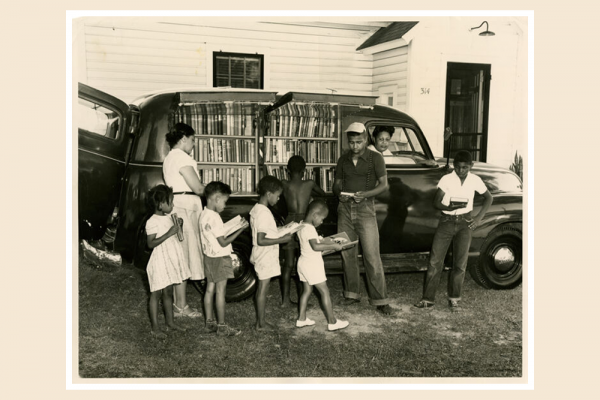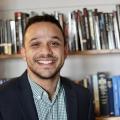In early October, Chicago-bred hip-hop artist and activist, Fatimah Nyeema Warner — better known as Noname — celebrated the grand opening of the Radical Hood Library in Los Angeles. The Radical Hood Library emerged from a book club Noname had started just a few years prior. This book club eventually led to Noname creating a space where radical literature could be provided free of charge to people from all walks of life — but especially Black and brown people. Noname hopes the space provides intellectual fodder for revolutionary transformation.
Gil Scott-Heron described this type of transformation in his poem, “The Revolution Will Not Be Televised.” In an interview about the poem, Scott-Heron explained why free access to knowledge is an important part of revolutionary transformation: “You have to change your mind before you change the way you live.” That transformation must begin internally is a familiar concept for Christians. This is why the apostle Paul admonishes the church in Rome to not conform to the pattern of the world, but to be transformed by the renewing of their minds (Romans 12:2).
As a student of political theology and the Hanna Holborn Gray Fellow in Subject Librarianship at Regenstein Library, I find myself constantly considering the insights and work of people like Noname, Scott-Heron, and the apostle Paul. Providing free and open access to radical literature — whether that be abolitionist texts or biblical texts — is a necessary prerequisite to revolutionary transformation.
Despite what they may say publicly, institutions continue to be driven by profit and enrollment numbers, making them leery of things like “public access,” and “revolutionary transformation.” For example, a researcher from the University of Chicago can use their ID to borrow books for a quarter, but a resident of the neighborhood must show a government-issued ID in order to be able to get access for only a seven-day period. Neighborhood residents do not get the privilege of borrowing books like researchers or students do. Regenstein Library is one of the premier libraries in the country, yet it remains largely inaccessible to its surrounding Black community members. This is wrong.
In keeping with the Black radical tradition and the story of the Israelites plundering the Egyptians before they fled Egypt (Exodus 12:35-38), I see my job as a library fellow to be transgressive insofar as I encourage students to “steal Egyptian gold.” Libraries are not just places to check out books but spaces where transformative visions can be cast, organizers and students can meet, and institutional knowledge can be turned upside down. Much like the late Black Mennonite Vincent Harding, or modern Black intellectual Fred Moten, I believe it is the work of scholar-activists to figure out ways to be in but not of institutions. In other words, we must figure out ways to redistribute Pharoah’s spoils for the sake of the mixed multitude.
To that end, at Regenstein Library, we’ve started book clubs, curated exhibits, and hosted events that touch on pressing issues for students who want to make their research more meaningful and accessible to the public. In particular, we started an abolition reading group in the summer of 2020 that focused on foundational abolitionist texts like Are Prisons Obsolete? and Break Every Yoke. That reading group has transformed into a new reading group — the race and capitalism reading group — which has brought together scholars, students, and community activists to think through the theoretical and historical relationships between racial subordination and capitalism.
Libraries and radical reading groups are unique spaces where the revolutionary transformation of our minds can take place. While there is much in our world today that deserves radical reconsideration, police and prison abolition is top on the list. Noname should not only be commended for opening the Radical Hood Library, but also for dedicating an entire section to police abolition where books from authors like Ruth Wilson Gilmore, Mariame Kaba, and Angela Davis can be found.
In the abolition reading group, we read Angela Davis’ now-classic text Are Prisons Obsolete? Reading this brought me back to Scott-Heron, as Davis believes that abolition begins with the transformation of one’s imagination. If we are audacious enough to believe that abolition is not only necessary but also possible, then we must organize, mobilize, and advocate for radical literature to be made widely available to all people. Reading groups and radical libraries provide us with the space for transformative potential that neoliberal education fails to provide. What Noname has created in Los Angeles is in continuity with both the Black radical imagination and the Christian imagination insofar as both of those traditions emphasize the importance of sharing possessions and knowledge.
Revolutionary transformation of the mind is significant for Christians as we are prone to make idols out of the current order of things. Radical reading groups and libraries should be seen as miraculous spaces where people from all backgrounds can gather to imagine how Pharaoh can be defeated with his own tools. Noname is showing us a prophetic model that can be mimicked by the church.
Got something to say about what you're reading? We value your feedback!







